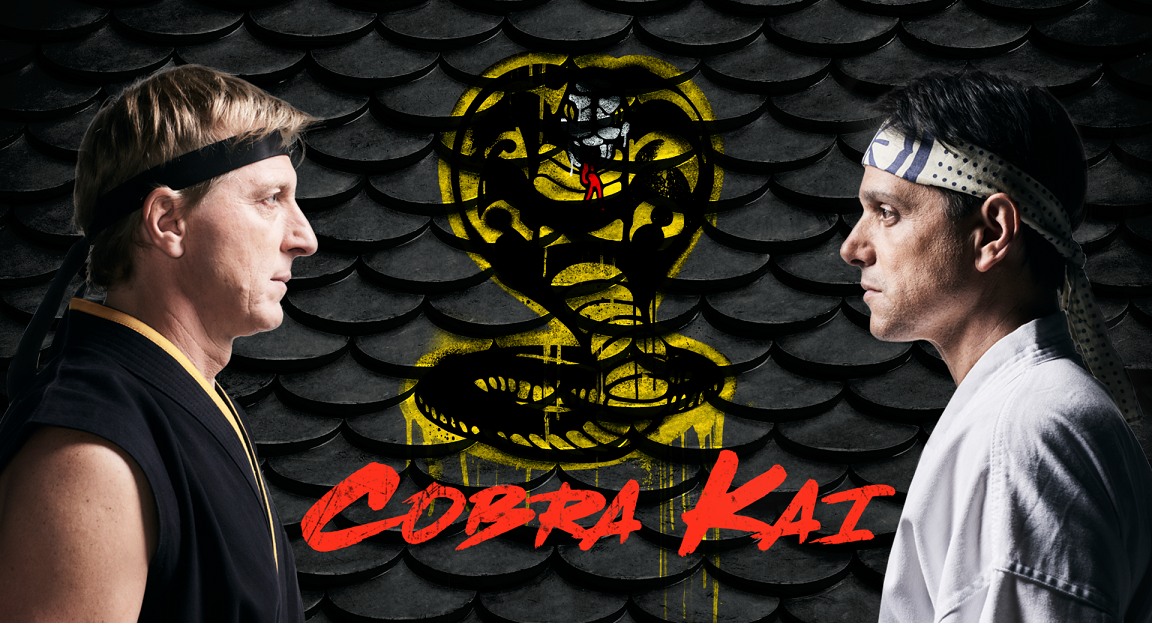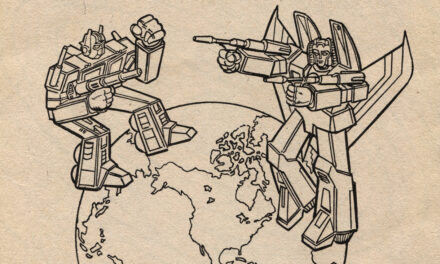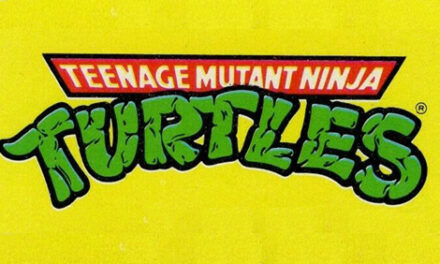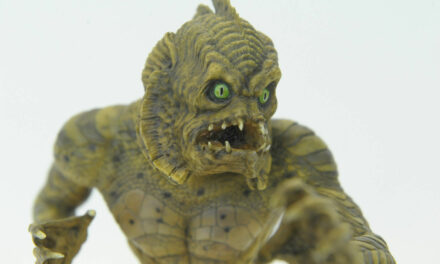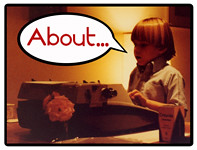I tend to sidestep talk of modern nostalgia-themed pop culture here at Branded because nine times out of ten I really don’t dig most of it. Most of the movies mining 80s era properties, either the relaunches of older cartoons and television series like the Transformers, G.I. Joe, Jem and the Holograms, and the Dukes of Hazzard, the remakes of classic (?) flicks from the decade, Footloose, Red Dawn, Robocop, Friday the 13th and Overboard, or the inspired-by films like Ready Player One, terribly miss the mark in my opinion. Then there plenty of TV series that are either inspired by or remaking 80s properties that run the gamut of quality between awkward pandering to fairly brilliant, with the former way more prevalent than the latter. I typically avoid talking about most of this stuff because there’s no point in dwelling on stuff I don’t like (complaining about pop culture on the internet is so pedantic), and even the stuff that I do like is usually discussed to death elsewhere and I never really feel like I have all that much to add to the conversation. Over the last year though, one new television series has really stood out to me in terms of how it was conceived, constructed and how it paid homage to it’s source material while still feeling very relevant to today. In fact, so much so that I just can’t stop thinking about it and I really wanted to take a second to talk about how improbably it’s succeeding. For once I don’t really care that this piece will just be another in a virtual tidal wave of articles and think pieces online. I just really want to talk about why I hope the recent hit series Cobra Kai never dies.
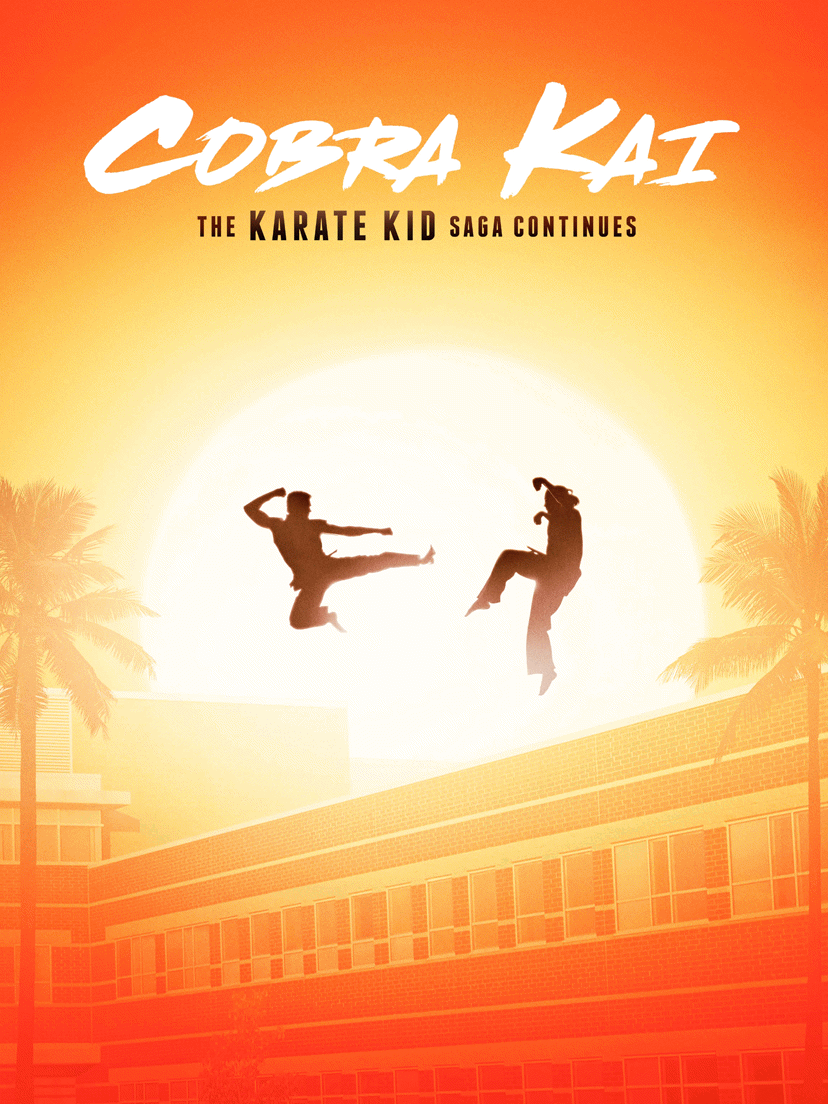
*Before I dig into this, note there will be spoilers for the series. I’m one of those folks who doesn’t care about being spoiled; to steal and paraphrase a mantra from one of my favorite podcasts (Switchblade Sisters), “It’s not what happens that matters, it’s how it happens.” But I respect if you do care about spoilers, and please proceed accordingly.*
When I first heard that William Zabka and Ralph Macchio were onboard to both produce and star in a modern Karate Kid television series I was pretty skeptical about the project. Initially it was billed as a comedy webseries that would pick up 30 years later from where the first film left off, but instead of focusing on Daniel LaRusso as the first three films were, it would be from the perspective of ex-degenerate, bully Johnny Lawrence. There was also a rumor that the series was inspired by a viral meme that cast Daniel as the true bully in the movies, which though funny for a minute, it a really silly idea. The fact that it was framed as a comedy really threw up some red flags for me as well as the film series is heavily dramatic, almost to a fault in the sequels. It also didn’t help that the series was made in partnership with Youtube to help flesh out the programming roster of their premium subscription streaming service, Youtube Red. I just felt like the potential for misunderstanding what made the original films magical was pretty high, and that at best the series might have a couple of fun jokes before it crumbled under the weight of a million “remember when <insert Karate Kid reference here> happened” moments. I fully expected to dislike the show and figured it’d be yet another nail in the coffin of 80s era nostalgia that would hopefully signal a need to move on to cannibalizing a new decade for content.

I couldn’t have been more wrong about the show. After binging the first season with my wife (who adores the original films even more than I do), we were shocked by how good the series was. Not only did it balance the humor and drama like Miyagi balancing on a stump at the beach, but it really did an awesome job of telling the story in a way that really does make the audience reconsider the perspectives of the first film. They managed to tap into those last few seconds of the first film, as well as the opening of the second to flesh out Johnny Lawrence as a way more complex and interesting character. It was so easy to hate him in the original movie as he (and to an extent a lot of the characters that Zabka would play in the 80s) is the quintessential evil bully. Sure, Daniel provokes him a couple of times, but the fury with which he strikes back in the movie is ridiculous. I was legitimately scared of Johnny as a kid, and avoided folks like him in middle and high school like they had the plague. So, it wasn’t an easy feat for the writers to twist that character into one that the audience can really get behind and root for.
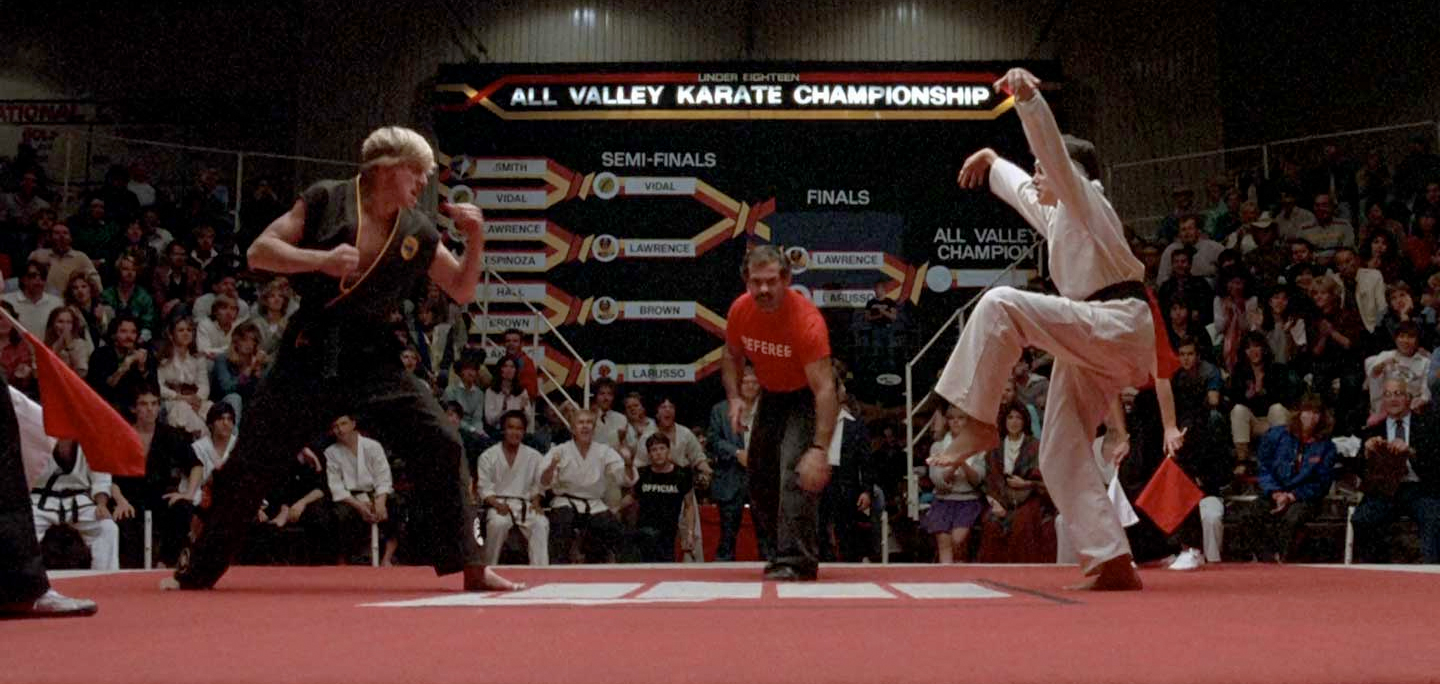
Much of the first season is build up that centers on reintroducing the audience to the characters of Johnny and Daniel as well as fleshing out the new world they inhabit. In a way it really mirrors the first film in terms of overall plot, only with Daniel and Johnny filling the shoes of John Kreese and Mr. Miyagi respectively (and yes, you read that order correctly.) There are new kids in need of guidance, a new All Valley Karate tournament to train for, and a lot of posturing and honor at stake. When we finished watching the first season I turned to my wife and said: “That was awesome, and way, WAY better than it should have been.” I really did enjoy the plot mirroring, the new characters and the little moments that paid homage to the original films, though I wasn’t completely blown away, just very pleasantly surprised and happy with how it turned out. As far as the mirroring goes, not only are the broad strokes of the first film used as a loose structure for this series, there are a lot of little details where the two main characters sort of switch places. Johnny is now living in a rundown apartment complex in Reseda that is very reminiscent of the South Seas apartments where the LaRusso’s lived in the original film, while Daniel and his family live in a very bourgie neighborhood in the Valley (probably very similar to the area where Ali and Johnny lived in the first movie.) Johnny, who sort of fills the shoes of the Miyagi character in the show, is a handyman (like Miyagi) who reluctantly befriends and trains a young kid named Miguel who is being bullied at the local high school. There’s also a humorous switch-up where Johnny, all these years later, calls Daniel out for using an illegal crane kick to the face to win the All Valley back int he day, as it’s very clearly stated in the rules that there will be no hits to the face. This is both a fun way of mirroring the illegal kick to the knee Daniel caught by Cobra Kai teammate Bobby in that tournament, as well as acknowledging a plot hole in the film that super fans have been discussing for decades. Again, there is a lot of these types of references and homage in the Cobra Kai series. There are Halloween dances, chores that could be misconstrued as training, fights in the school cafeteria, visits to the Encino Oaks Country Club, dates at Golf & Stuff and plenty of classic quotes from the original film (though most used in a slightly new context.)
There were some things I wished had been addressed (mainly, appearances by some of the other Cobra Kai from the original film) that I was surprised weren’t considering the series had almost as much screen time to work with than the first three films combined. I really enjoyed the show and was stoked for a second season, but still decided to keep my expectations low so that hopefully I would be pleasantly surprised again. That sophomore effort in television really is the make it or break it of most TV series and there was still a part of me that thought the show-runners and writers might botch the job because as good as the first run was, how long can you really keep up that game. Though the nostalgia was handled very well in Cobra Kai, it’s hard to sustain that level of quality when the well you’re drawing from is finite, and they had already touched on most of the fan favorite moments from first film. I honestly didn’t anticipate where the show would go in the second season.
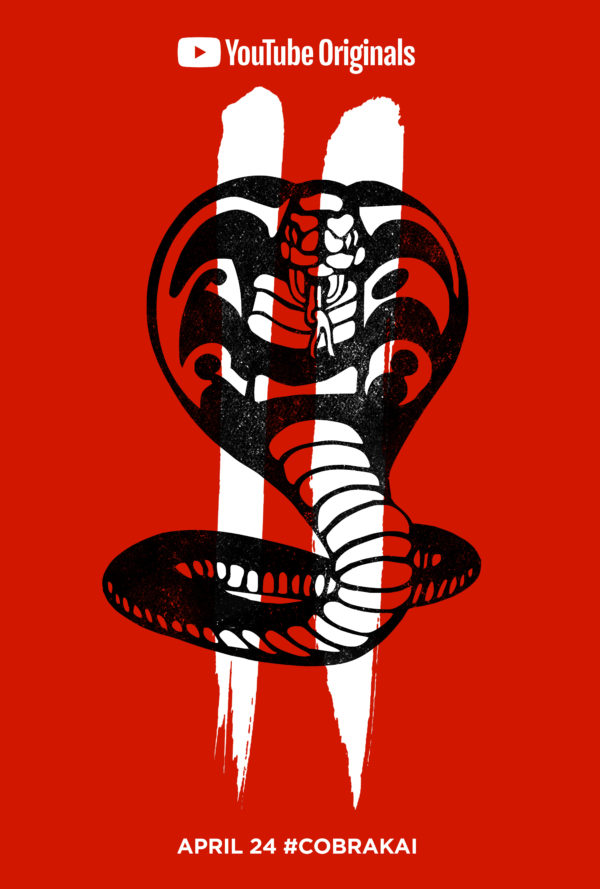
To say that I was not prepared for where season 2 would lead is an understatement. The broad strokes? If season one uses the first Karate Kid as a roadmap, then season 2 uses Part 2 & 3 at its major influence on the story. By that I mean that this show is no longer about tournaments and “safe” karate. Like in the second film the stakes are raised and this story is now about the real world where there are no rules and the fighting gets dirty. But where the show really shines for me in these new episodes is that the production resists the urge to simply mirror the second & third movies. Yes, there are a lot of sequel references in these 10 episodes. There are callbacks to the ice block breaking, the den-den daiko (the drum Daniel uses to train in Okinawa), Miyagi’s family dojo, Kreese “returning from the dead” to enact his revenge on Daniel LaRusso, Kreese punishing Johnny and almost choking him to death, Terry Silver and Daniel’s short stint as a member of the Cobra Kai, and some sweet, sweet Peter Cetera. But the series really starts to live and breath through the new characters and their story arcs. Again, though there are some clear references to the original movie and its sequels, most of the best ones are hidden in plain sight in such a manor that they no longer play like homage unless the audience really knows their Karate Kid trivia. Instead, the show heavily leans on the young cast of characters and creates a wholly new dynamic in this particular cinematic universe which is a war between the dojos. Sure, Miyagi-do Karate and Cobra Kai have clashed in the films, but not in the way they do in this series with multiple students of each squaring off, each with their own motivations and arcs. This season broadens the story to a point where it feels more like a universe of characters, yet loses none of the intimacy from the films. This is certainly a new dynamic and it opens up the world of the story to allow all kinds of new ideas.
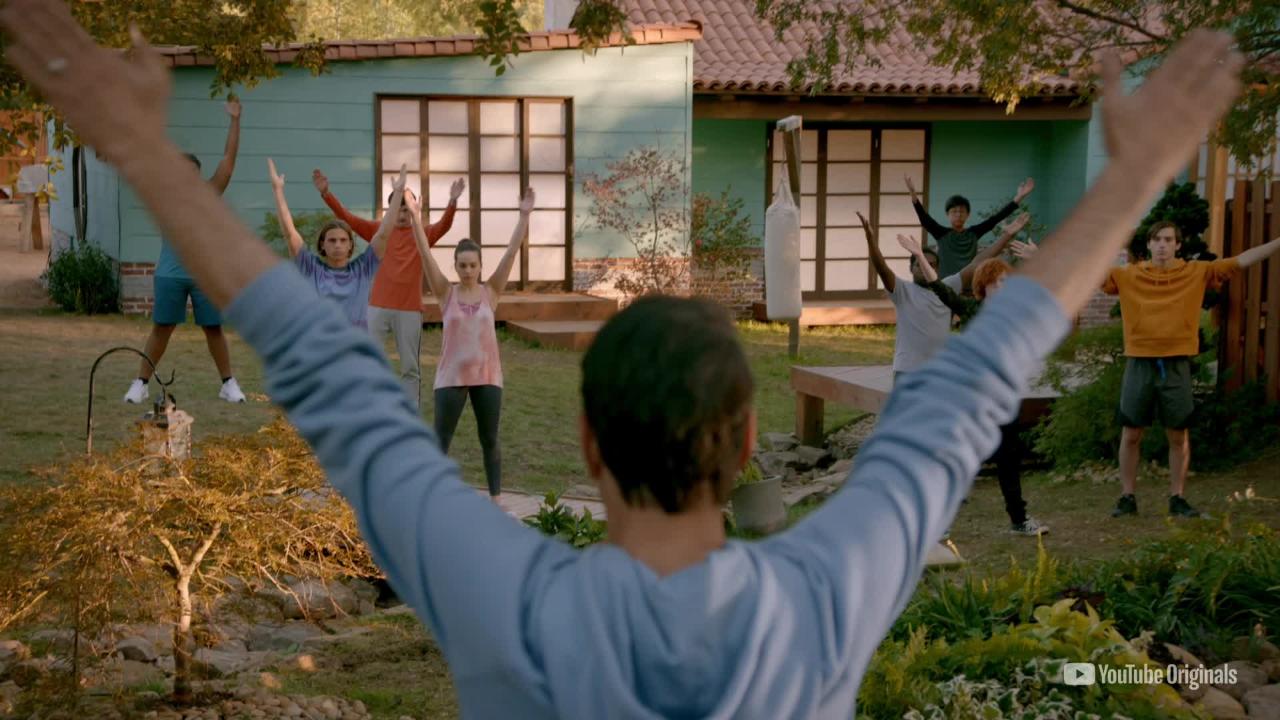

There is so much going on in this season, from the return of Kreese and how Johnny deals with it to the strain on the LaRusso’s marriage due to his growing obsession with destroying Cobra Kai and wanting desperately to live up to the memory of Mr. Miyagi. There’s the emergence of Hawk as a dominant member of Cobra Kai who is steadily embracing the 3rd rule of his dojo, No Mercy, as he seeks to break his former best friend and prove that he’s the best around. The love triangle between Miguel, Samantha and Robby becomes a square with the introduction of Tory, a surfer girl who learned the rules of Cobra Kai before she even set foot in the dojo. I could write three thousand words about this season alone, but by far the episode I really want to talk about is the sixth, titled “Take a Right” which reunites Johnny with three of his former friends and Cobra Kai members from high school Tommy, Bobby and Jimmy.
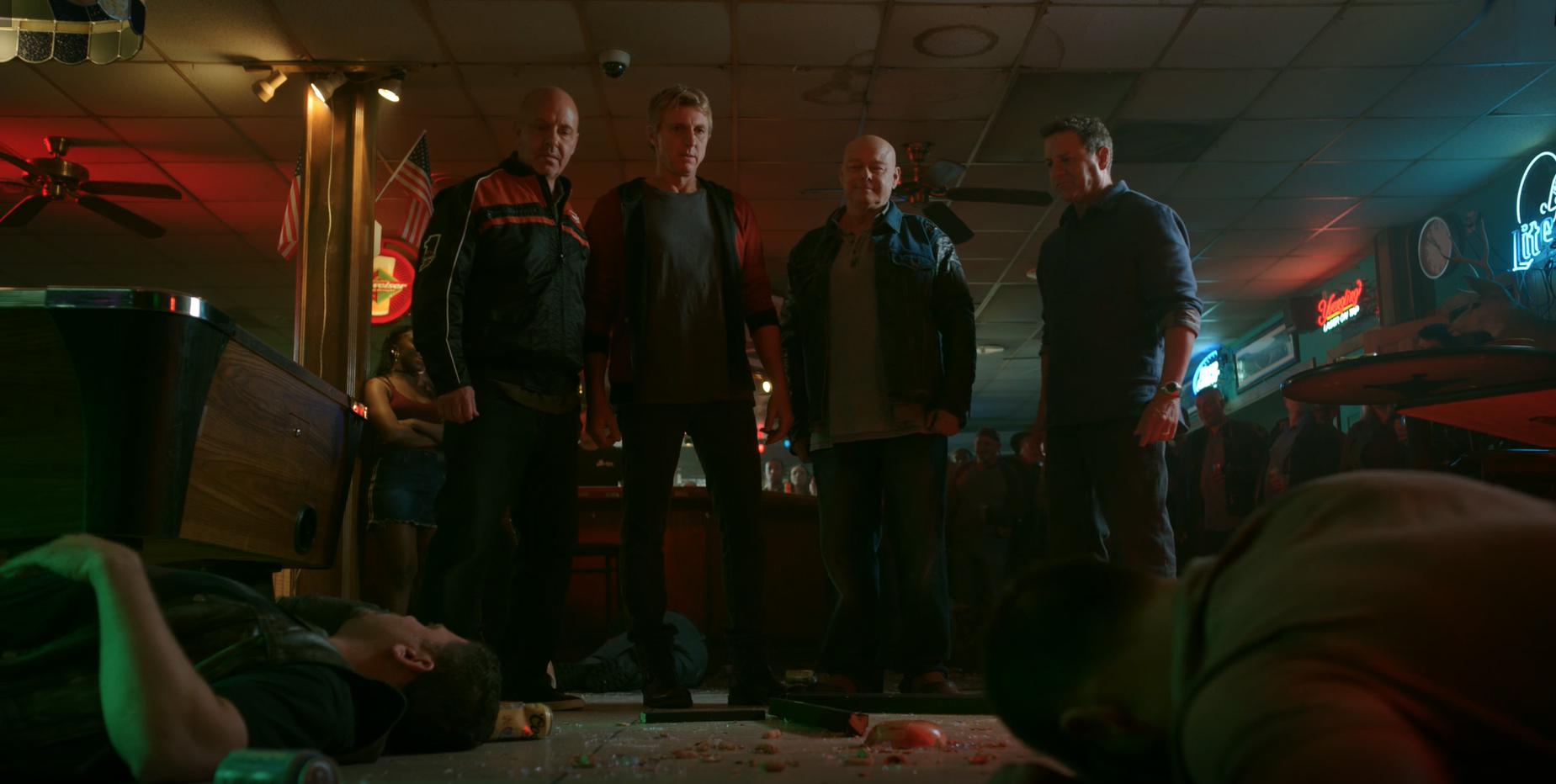
What I really love about this episode is that aside from the fact that we get to see an old school Cobra Kai reunion, is that it handles the nostalgia and references so perfectly. When considering a series like this that picks up 30 years after the original film the writers have to be careful in how they handle the characters. I think the urge when creating these types of stories is to pick up right where the original left off, to try and recreate the magic of the original and almost to pretend like little has happened in the intervening years so that the audience will be engaged, all in, and you can pay off the wait. I think this is a mistake that a lot of nostalgic projects like this make, one that actually disengages the audience as they start to ask too many question that take them out of the experience. I recently learned of this concept called the “unseen film”, which is a screenwriting term that refers to events that aren’t seen on film, but that the audience is fully aware of and is affected by. Think of a movie like Cloverfield that centers on a few characters running for their lives in the midst of giant kaiju attacking New York City. One of the things that really makes that movie work is the unseen. The audience rarely sees the monster clearly attacking and we’re restricted to following a small group of people fighting for their lives, but on a deeper level they are also aware of a much bigger story going on off-screen that enriches they story they’re watching. Or consider a film like a Quiet Place that picks up after the events of the film have already started. We learn about the characters and the world naturally through their everyday actions instead of watching it from the beginning and the because of that the characters seem more well developed and the world lived in. We’re not spoon-fed the story and that is a good thing.
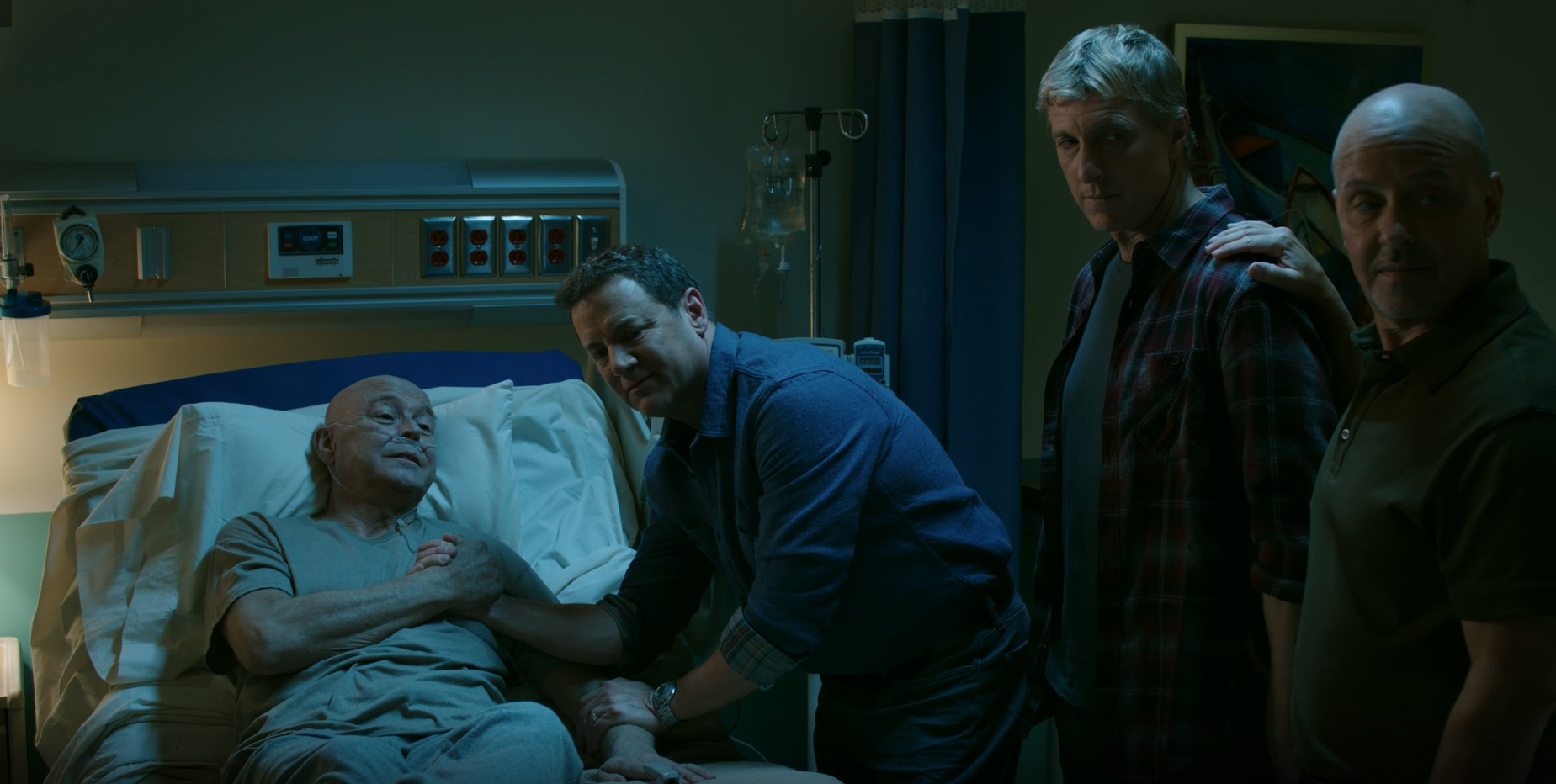
This is how the production treats the Cobra Kai reunion. For all intents and purposes, this reteaming of Tommy, Johnny, Bobby and Jimmy has little to do with the overall plot of the show. It’s a side story that is very true to the world and characters, yet it has themes and repercussions that reverberate with Johnny’s arc in the new series. In this short story, Johnny is contacted by Bobby who lets him know that Tommy is in hospice care battling an aggressive stage four cancer. Fearing that his friend will wither away very soon he does his best to reach out to the old gang so that they can say goodbye and maybe give him one more adventure. What I really love about this is the massive amounts of catharsis and callbacks there are to the original film that aren’t knocking you over the head. Again, sure, the show does give you a couple of moments of more obvious homage. The original Cobra Kai (minus Dutch who is serving 10 years in prison we learn thanks to some handy exposition from Bobby) mount up on some motorcycles complete with flashbacks to the original film…
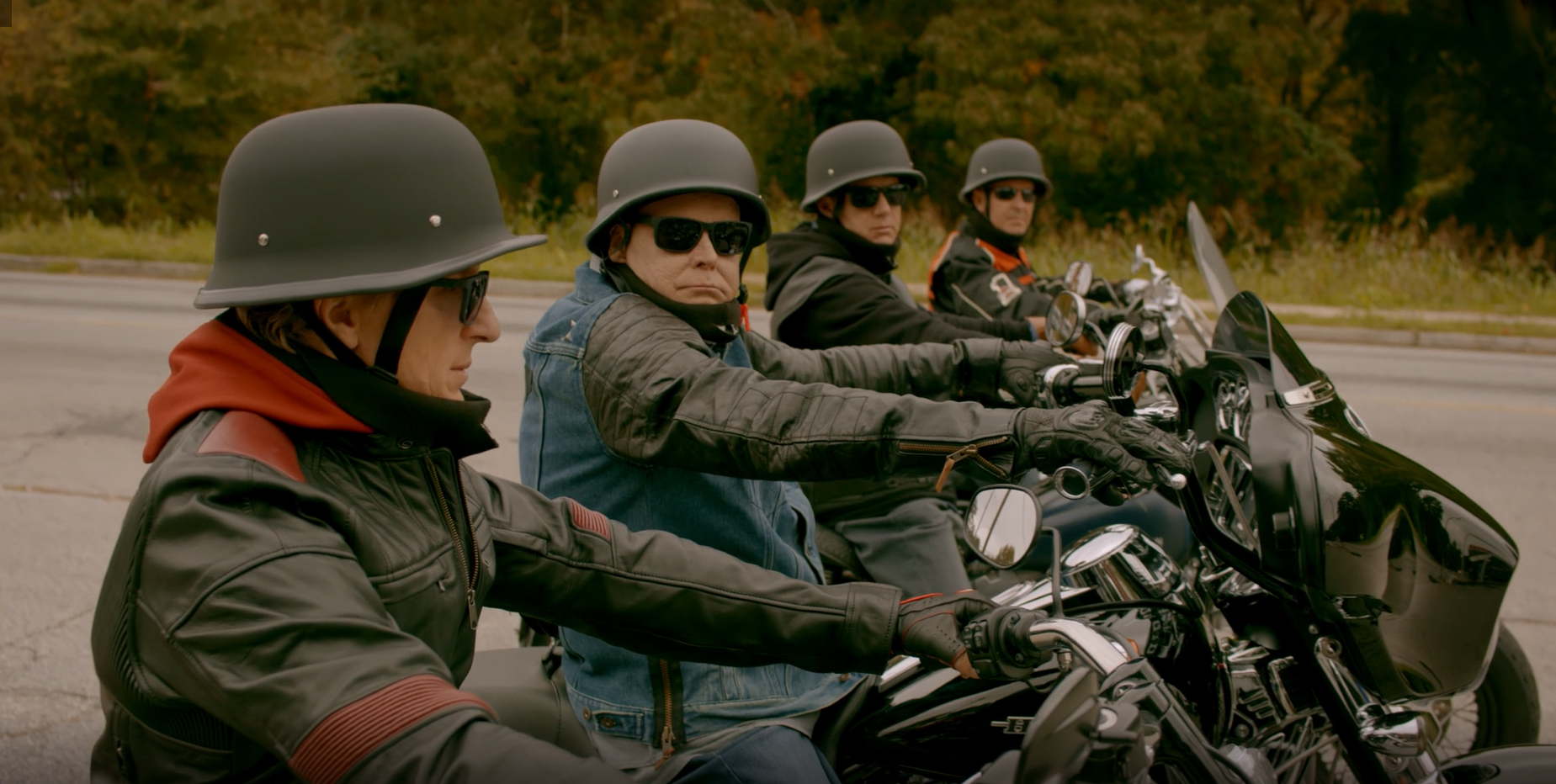
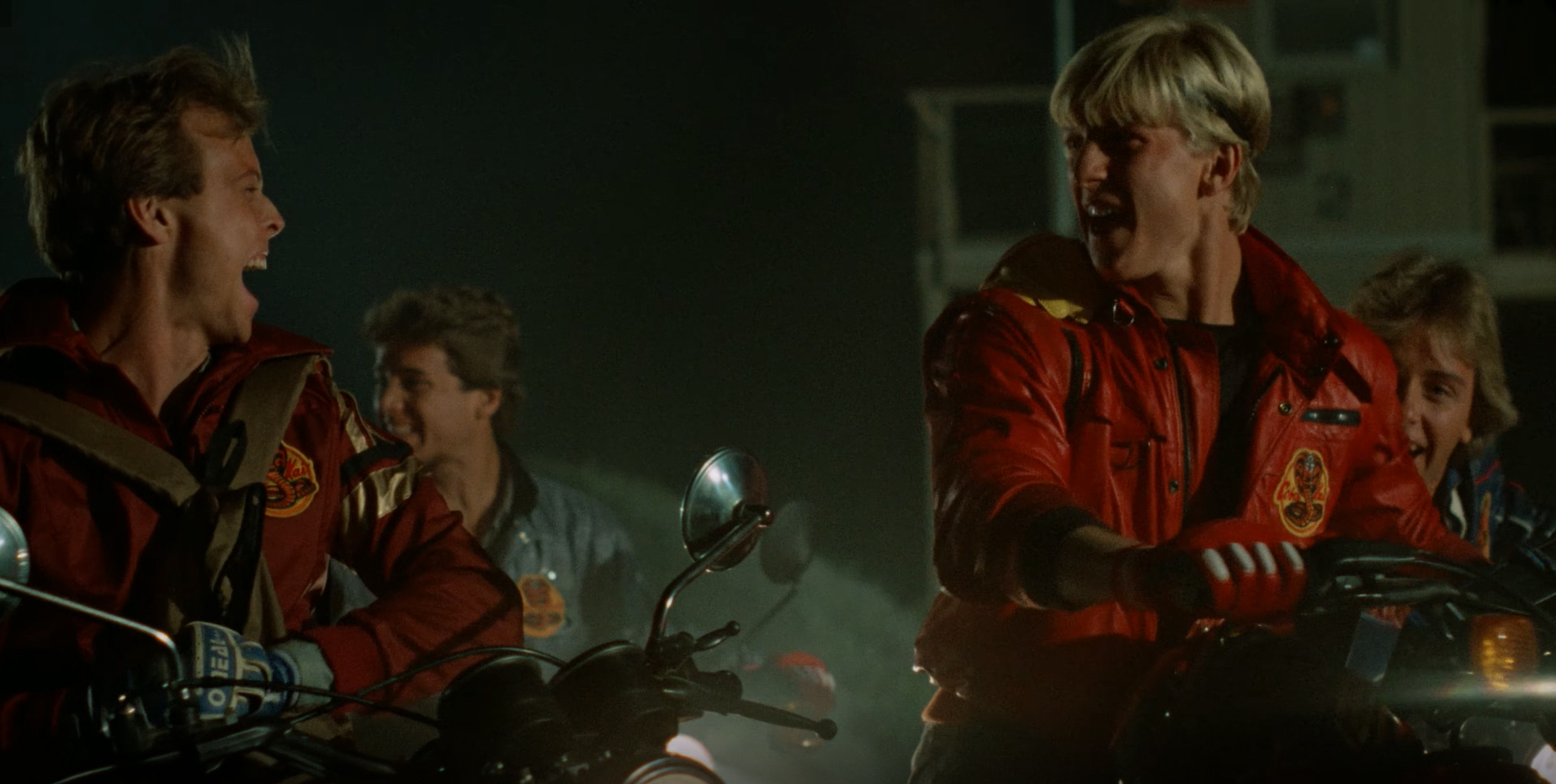
There’s also a really fun bar fight where the four Cobra Kai take on all kinds of surly bikers that is very satisfying. But where this story really shines is in the more subtle references. The Cobra Kai members in the original film are a mixed bag in terms of how mean the characters were depicted. They run the gamut from the reluctant bully Bobby, to the out right evil Dutch. This is where I really appreciated how this episode was handled. Knowing that Dutch is in prison is beyond fitting for that character. And the fact that Bobby is now a pastor speaks volumes about where his character was in the original movie and where he is now, 30 years later, atoning for his sins and finally giving himself to his community to pay them back. Heck, the fact that it’s Bobby bringing these guys back together is very telling. I really adore how this side story works with Johnny’s character too. In a moment when he is really beginning to doubt the good that he is trying to do by reopening the dojo, see these guys and where they are in life is very impactful on him. Bobby finally gets to be a force for good in their dynamic and it is awesome to see it play out on screen.
This episode also has one of the best callbacks to the original movie that I think is just subtle enough that most folks might not catch it. I know that’s a big assumption on my part, but I was watching this with my wife who is by and large way more aware of this kind of stuff in movies and TV, so I’m using her as a measuring stick for the general audience. In the story, as I mentioned above, Tommy is in his last days battling cancer and this quick road trip is his character’s swan song. Surprising no one, he passes away peacefully in the night while they gang is camping in the woods. When they wake up they try in vain to revive him, and the paramedics are called. The episode ends with a final lingering shot of Tommy as he’s being placed in a body bag. At first this didn’t hit me and as the credits rolled I even forgot the scene weirdly and I freaked out and went scrambling for the remote to rewind back to that moment. In my mind the sound clip from the final tournament of the first film was playing on loop in my head where Tommy yells to Johnny, “PUT HIM IN A BODY BAG, YEAHHHH!” I mean, come on, how appropriate was that reference? So perfect, and I believe without revisiting the movie just beforehand, subtle. I’m not sure how many people could name the various members of Cobra Kai, let alone remember who yelled that out during the match.
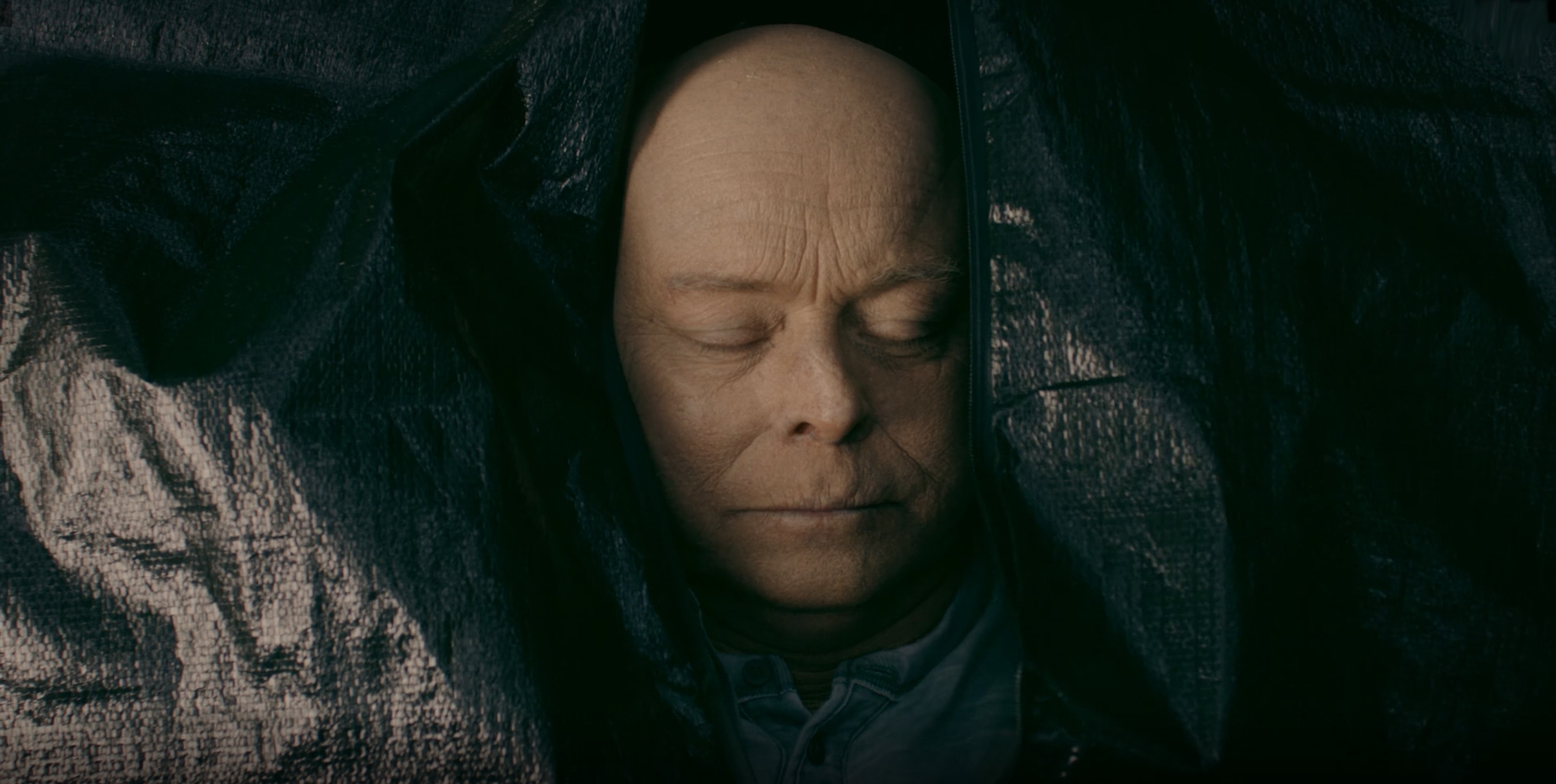
And that is a perfect example of why I love this new series. Again, the season ends with an intense cliffhanger with serious ramifications for the next leg of the story. Let’s hope the production sweeps that leg in season 3 and that Cobra Kai Never Dies.

